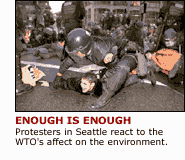
DECEMBER 1999 | Renaissance Online Magazine's News Wire features the latest news coverage and analysis. Bookmark this page and return often for our frequent updates. PAST NEWS
FULL ISSUE CONTENTS |

Biological Diversity and the Battle in Seattle
by Marc Ciampa 
The question, then, is why would so many of the people protesting risk tear gas and pepper spray to stand up for what they believe in at this particular function? The reason is because the World Trade Organization has affected the environment--and in particular the biological diversity on this planet--negatively through its blatant disregard for improving the conditions of the world around us and its "bottom line" profit-mongering philosophy. Biological diversity, or biodiversity as it is sometimes known, is key to the survival of human beings on the planet earth. It is defined as the large variety of life on earth, including different ecosystems and the species within. As environmentalist Jacques Prescott states, it "encompasses all living organisms, including varieties created through genetic manipulation or selective cross-breeding. This diversity makes up the biosphere, the web of all living organisms, including humans." While the environment depends on the organisms within it, similarly the organisms, including humans, depend on the environment. Without a biologically diverse planet, life would be much different. The economy is extremely dependent on biodiversity, through such industries as fisheries, forestry, farming, hunting and nature observation. Also, technological advances such as agriculturally and medically result from biodiversity. Unfortunately, the biological diversity that we depend on is slowly declining. In the last two hundred years, the amount of biological change in the environment, including the loss of species, has been phenomenal. It has, in fact, equalled the amount of change that occurred over the last ten thousand years. A question to ask, then, is why is it declining so rapidly? One of the key reasons is because of the enormous population explosion that has not-so-coincidentally coincided with this loss of biodiversity over the past several hundred years. Generally, people need more space, create more waste and consume more resources. More specifically, through agricultural and industrial development as well as the exploitation and overharvesting of natural resources, we alter habitats and subsequently lose species. We also pollute the very soil, water and air we need to survive. Another thing humans are doing to alter ecosystems and reduce biodiversity is release increasing amounts of many harmful greenhouse gases such as carbon dioxide into the atmosphere and thereby cause global warming. From observing the magnitude and seriousness of these impacts, it is clear that the loss of biodiversity is a problem that must be reversed. Unfortunately, very powerful groups like the World Trade Organization appear to be doing their best to either ignore or escalate the problems at hand when they are in a position to do the opposite. [ MORE: environment be damned ] |